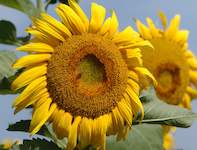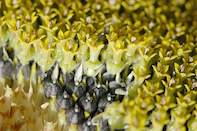The sunflower (Helianthus annuus L.) is the most important and versatile oilseed crop in South Africa and the fourth most important vegetable oil in world trade after soya, peanut and rapeseed. South African sunflower production ranges from 600 000 tons to 800 000 tonnes.

This summer crop in South Africa, it is farmed for oil, as an edible seed for humans and birds and for its use as oil cake in animal feed formulations.
It is useful in crop rotation programmes, can adjust to a wide variety of soils from heavy to sandy loam soils as well as marginal soils. Other important benefits are a shorter growing season than maize and can, therefore, be planted a little later if planting conditions are not ideal and can also tolerate early frosts.
What are Sunflowers?

Sunflowers belong to the genus Helianthus - ‘helios’ means sun and ‘anthos’ means flower. Sunflower leaves are phototropic - it follows the sun’s rays - and the characteristic yellow flower is, in fact, not a single flower but made up of 1 000 to 2 000 individual flowers.
The genus contains almost 70 different species ranging from knee-high ornamental flowers for gardens to hybrid oilseed types over 4.8m high planted for large-scale commercial seed oil production.
Oilseed type sunflowers are high in oil content (40% - 50%) and processed to sunflower oil and meal. Oilseeds are high in oil content and are typically processed into sunflower oil. The byproduct of sunflower oil processing is oil cake and meal.
Depending on the types of fatty acids in the oil, sunflower oil cultivars can be divided between linoleic, high-oleic, and mid-oleic sunflower oils.
World Sunflower Seed Production
Ukraine was the world’s biggest producer of sunflower seeds with 15 million tonnes in 2018/19 with Russia in second place. The Great Plains in the USA and Canada are also major producers of sunflower seeds for oil production.
The EU estimated that yields in 2018 were on average 2.5 tonnes/hectare, an 18% increase in the five-year average.
The increase in sunflower yields and production has been much greater in Eastern Europe than in the US, where the planted area has actually decreased by about 30% from 2008 - 2018 with a production decrease of 25%.
The increase in Eastern European sunflower production has increased world production by 80% over that decade. This was accompanied by a 46% increase in yield.
Sunflower Production in South Africa
Sunflowers are a summer crop and most prevalent in the summer rainfall areas of South Africa.
The production of sunflower seed is concentrated in the Free State and North West provinces which together account for around 80% of the farmland planted to sunflower.
Sunflower seed production was almost 681 000 tonnes in 2018/2019 compared to 859 000 tonnes produced during 2017/18. The average yield was 1.32 tonnes/hectare in 2018/19.
South Africa is a nett importer of sunflower seeds, mainly from Europe, but also from SADC countries and the Americas.
By Marinda Louw